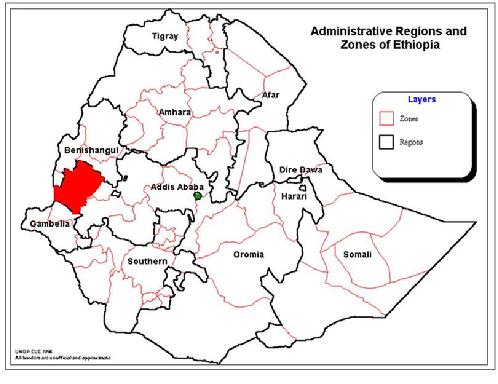Mt. Tulu Welel (10,900 ft.), Western Wollega, Ethiopia
|
EREP established two model schools to teach kindergarten through Grade 4 in Western Wollega, Ethiopia. The learning model used was developed at the Rishi Valley Institute for Education Resources in India. Four years is commonly accepted as the level necessary for permanent literacy and numeracy.
The rural areas of western Ethiopia are in great need of schools, having had 132 schools confiscated or destroyed during the Marxist regime in the 1970s-early 1990s. And, population increase adds to the urgency to provide schools. The literacy rate is about 20 percent for men, and less for women.
The schools teach the standard Ethiopian state curriculum. The Development and Social Service Commission (DASSC) of the Ethiopian Evangelical Church Mekane Yesus (EECMY) administers the schools. Admission is open to students in the community regardless of gender or religious affiliation. Girls are especially encouraged to attend.
The schools are located in the Western Wollega Bethel Synod shaded red in the map below.
|
 |
| Western Wollega Bethel Synod |
|
|
The Rishi Valley model is efficient and effective, and was selected by the EECMY leaders in Dembi Dollo, Ethiopia, to implement in their community.
The schools use inexpensive, computer-generated, instruction cards, referred to as the “school in a box”; the cards are shared among all students in the school. The cards are laminated, thus extending their life-use to about three years.
Children progress through the cards at their own pace after satisfying the teacher that they have mastered the material. Children study in groups defined by learning level (not age), and help each other learn under the supervision of a teacher.
|
Teachers in these schools have graduated from government educational institutes. Because children progress at their own pace, each child succeeds.
In India, children who complete the curriculum perform as well or better on state examinations compared to children who attend the Indian government schools; we anticipate similar results in Ethiopia. The “school in a box” has more than 20 years’ success in India. It has been adopted by many localities in the State of Andhra Pradesh and by the 40,000 government elementary schools in the State of Tamil Nadu, India It also has been adapted for tribal peoples and for other states (and languages) in India. The Rishi Valley administrators who advise this project are well experienced at adopting the methodology to other languages and cultures.
|
|